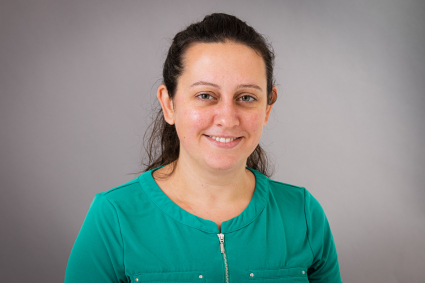Marilyne Labrie
Ph.D. immunology and virology, 2016
Assistant Professor, Université de Sherbrooke
“I was quickly charmed by the Centre Armand-Frappier Santé Biotechnologie research center, an ideal place for me because of its human scale, friendly energy and collaborative work, as well as the support of the technicians working on the research platforms.”
After obtaining her bachelor’s and master’s degrees in biology at the Université du Québec à Montréal in 2009, Marilyne Labrie chose to pursue her doctoral studies in the field of immuno-oncology at the Centre Armand-Frappier Santé Biotechnologie research centre at INRS, under the direction of Professor Yves St-Pierre. “I was very interested in Professor St-Pierre’s work on cancer. After consulting with researchers and talking with a few colleagues and professors, I was recommended to Professor St-Pierre without hesitation. I was also quickly charmed by the center, an ideal place for me because of its human scale, the friendly energy and the collaborative work, as well as the work and support of the technicians working on the research platforms. It was the right place for me, and I loved working with Prof. St-Pierre,” she affirms.
Following the completion of her PhD in 2016, Marilyne is undertaking postdoctoral training at the MD Anderson Cancer Center at the University of Texas, a major cancer research center in the United States. Under the direction of Dr. Gordon Mills, a world leader in the field of ovarian cancer, she is interested in the molecular mechanisms underlying resistance to targeted therapies in patients with gynecological cancers. She says it was a rewarding experience and she learned a lot. She then followed Dr. Mills when he moved to Oregon Health & Science University. There, she contributed for three years to the implementation of a new multiomics platform [a biological analysis approach in which the data sets are multiple “omes,” such as the genome, proteome, transcriptome, epigenome, metabolome, and microbiome] for the follow-up of cancer patients.
In 2021, Marilyne returned to Québec with her young family to take on a new challenge as a professor-researcher at the Department of immunology and cellular biology at Université de Sherbrooke, where she is starting a new research program on the mechanisms of resistance to immunotherapy in ovarian cancer. She is currently setting up a unique multi-comics platform, like the one she established during her training in the United States. This new and innovative research program will have a concrete impact on the way patients with aggressive cancers are treated.
When asked to share special moments from her time at INRS, Marilyne happily recalls her job as an animator in the Apprentis chercheurs program, a position she held for a few years. This program was created more than twenty years ago to introduce youth to scientific research. “It was the first time I was called upon to do science popularization! Not only did I have to demystify the research environment for young people, but I also had to guide them in their science project.” She found it a very enriching and formative experience, both for her and for the young people she worked with.
The level of autonomy that Marilyne experienced during her studies is also part of her positive experience at Centre Armand-Frappier Santé Biotechnologie research centre. Her research supervisor allowed her to develop fruitful collaborations, both internally and externally, and a distinct approach. She says the quality of her supervisor has been a big influence on her career. “I have nothing but praise for my project director. He let me explore scientific ideas and allowed me to try new things. If I had one piece of advice for students, it would be to keep an open mind. Be curious. New opportunities open when you step out of your comfort zone. You often learn more when you think outside the box, and it becomes easier afterwards,” she says.
And her fondest wish? “It would be to build in a few years a personalized medicine platform for ovarian cancer patients to better target the treatments offered to patients. This cancer is the third most common cancer of the female reproductive system in Canada with a five-year survival rate of only 40%,” she emphasizes.
[Interviewed in October 2022.]

